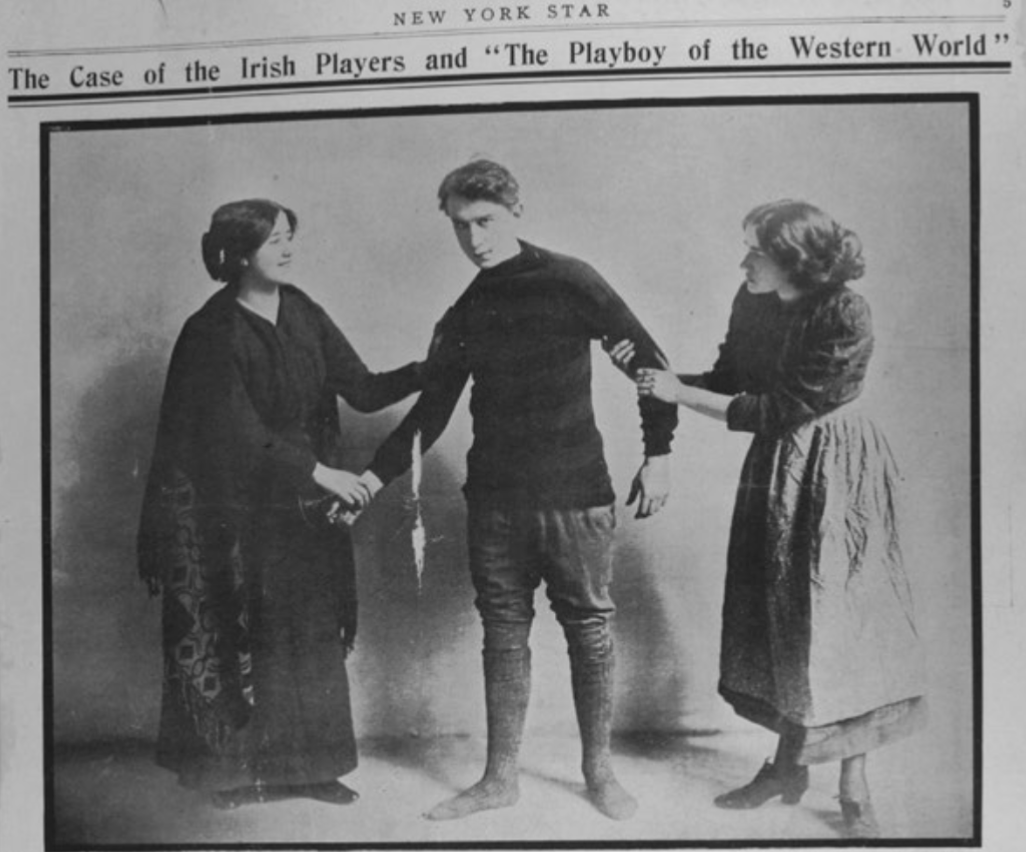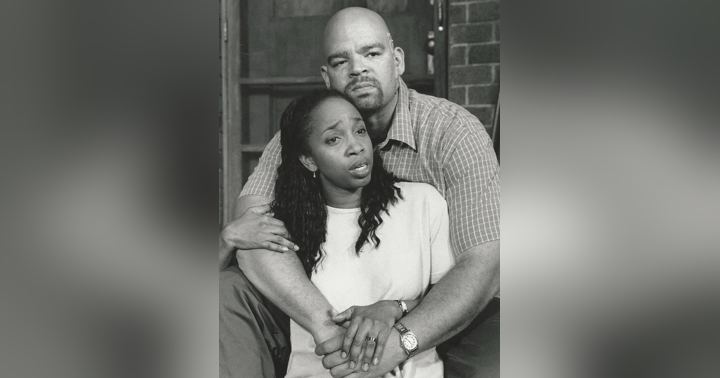
Above left: The actors Sara Allgood ("Widow Quin") and J. M. Kerrigan ("Shawn Keogh"), in the Irish Player's 1911 production of The Playboy of the Western World. Above right: a photo published in many American newspapers as word spread about the controversy over Bernhardt's production of La Samaritaine in December of 1910. Below, a photo of Bernhard onstage in the role of Photine, and another actor (Bremont) as Jesus.
In Chapter Four of the Gospel of John we find the story of The Samaritan Woman at the Well. In the English language Revised Standard Version, the text describes Jesus traveling in Samaria, to the north of Judea, and he comes the city of Sychar:
Jacob’s well was there, and so Jesus, wearied as he was with his journey, sat down beside the well. It was about the sixth hour.
There came a woman of Samar′ia to draw water. Jesus said to her, “Give me a drink.” For his disciples had gone away into the city to buy food. The Samaritan woman said to him, “How is it that you, a Jew, ask a drink of me, a woman of Samar′ia?” For Jews have no dealings with Samaritans. Jesus answered her, “If you knew the gift of God, and who it is that is saying to you, ‘Give me a drink,’ you would have asked him, and he would have given you living water.”
Jesus then astounds the woman, because although he had never met her before, he knows every intimate detail of her life - especially her relationships with many men. When she asks him how he knows so much, he reveals to her that he is the Messiah, she believes it, and goes to tell the other people of the village:
Many Samaritans from that city believed in him because of the woman’s testimony, “He told me all that I ever did.” So when the Samaritans came to him, they asked him to stay with them; and he stayed there two days. And many more believed because of his word. They said to the woman, “It is no longer because of your words that we believe, for we have heard for ourselves, and we know that this is indeed the Savior of the world.”
In 1897 Edmond Rostand chose this story for his next play - the same year he wrote his heroic comedy Cyrano de Bergerac, the work that would make him immortal. At the request of Sarah Bernhardt, he wrote the title role of La Samaritaine for her, giving her character the name of "Photine" (a name which could mean "she who has seen the light"). He had already written the failed play La Princesse Lointaine (a medieval romance), and would go on to create L'Aiglon (The Eaglet) for her as well.
As a play, in fact, La Samaritaine has language rather reminiscent of the Song of Solomon, with a lot of evangelical uplift. It gave Bernhardt the chance to enact a fallen woman being saved from debauchery - which of course was her stock in trade, as it were. When asked to describe the play, Rostand told a journalist to imagine a well-known Parisian courtesan of the day, Liane de Pougy, meeting Christ, "then going back to Paris to preach the Holy Gospel to her depraved friends."
La Samaritaine was originally written for the Easter season, but then had gone into Bernhardt's repertory for a dozen years at the Theatre de la Renaissance in Paris, before the events of this episode. She would bring it out every year for Holy Week. As Bernhardt protested to the American newspapers, up until 1910 it had never come under a hint of criticism for blasphemy - not in Europe, anyway.
There is, of course, a famous Alphonse Mucha poster of this play, which would go on to decorate many American homes in the following century. Here it is, next to another photograph of Bernhardt in the role:
A recording of Bernhardt reciting from Rostand's La Samaritaine exists on a 1903 gramophone disc. I considered using some of this audio for the podcast episode, but I had to admit that not only was the sound quality just too low, but that Mme. Bernhardt's recitation doesn't really make for very good listening. But still, for historical interest, here it is:
https://www.youtube.com/watch?v=6Tvmv57QjNc
______________________________________________________
Below, a photo from the New York Star in December of 1911. It shows the touring cast of the Irish Players The Playboy of the Western World, when it was first raising a fuss in America.
Shown in the photo are Sara Allgood (Widow Quin), Fred O’Donovan (Christy Mahon) and Eithne Magee (Pegeen Mike). O’Donovan had taken over the role from William Fay who played the role of Christy in the original 1907 Abbey Theatre production. The Star reported that on the night of the show's first performance at Maxine Elliott’s Theatre, "twenty-seven persons, including seven women, were ejected for making a disturbance."
After completing the writing and recording of Episode 49, I went to the Periodicals Room at the Free Library of Philadelphia. I wanted to look through a few more items about the protests against Playboy in the Philadelphia papers from January of 1912, just to make sure I hadn't missed anything. I was secretly hoping, of course, that there was some photo or editorial cartoon that I could share in this blog post. Alas, I didn't find anything like that, but I did find an extra tidbit in the Philadelphia Evening Bulletin. It seems that one of the protestors had come to the Adelphi Theatre with a pocketful of rotten eggs in his coat, intending to hurl them at the stage. But the man was interrupted in his efforts by a plainclothes Philadelphia policeman, who quickly grabbed him and dragged him into the aisle. His cache of eggs were smashed in his pocket during the struggle, which left him smelling pretty disgusting. As he was led up the aisle other members of the audience laughed at his plight - and told him they didn't see anything so wrong with the play, themselves.
Finally, a photo of Rev. George Chalmers Richmond, taken several years after the events of this story. I was glad to learn he finally found a home church at last out in Wyoming:
Selected Bibliography:
Books:
Abernethy, Lloyd M., "Progressivism: 1905-1919" in Philadelphia: A 300-Year History, Russel F. Weigley, ed., W.W. Norton & Company, 1982, pp. 524-565.
Gold, Arthur, and Robert Fizdale, The Divine Sarah: A Life of Sarah Bernhardt, Vintage Books, 1992.
Laufe, Abe, The Wicked Stage: A History of Theater Censorship and Harassment in the United States, Frederick Ungar Publishing Co., 1978.
McEvoy, Sean, "Representing a Nation: The 1907 Playboy of the Western World Riot at the Abbey Theatre, Dublin" in Theatrical Unrest: Ten Riots in the History of the Stage, Routledge, 2015.
Newspaper Articles (in chronological order):
"Indecent Shows Menace to Stage", Philadelphia Inquirer, February 11, 1909, p. 4.
"Catholics Would Ban Bernhardt Play," New York Times, December 15, 1910. p 9.
"Gaynor Can't Stop Sarah, " New York Tribune, December 15, 1910. p. 9.
"Clergy Oppose Even One Scene of La Samaritaine," Philadelphia Inquirer, January 16, 1911, p. 1.
"Bernhardt Here, Determined on La Samaritaine," Philadelphia Inquirer, January 30, 1911, p. 2.
"Call Big Meeting to Protest Play, Philadelphia Inquirer, January 31, 1911, p. 1.
"Mayor Prohibits La Samaritaine," Philadelphia Inquirer, February 1, 1911, p. 1.
"Curbing the Theatres," Philadelphia Inquirer, February 1, 1911, p 1.
"Think Theatrical Censor Needless," Philadelphia Inquirer, April 15, 1911, p. 2.
"Irish Players Show Much Dramatic Force," Philadelphia North American, January 14, 1912.
"Adelphi", Philadelphia Inquirer, January 14, 1912, p. 39.
"Lady Gregory Talks of National Theater," Philadelphia North American, January 15, 1912.
"Halt Performance of Playboy With Hoots and Yells," Philadelphia Inquirer, January 16, 1912, p. 1.
"Irish Play Row in Philadelphia", New York Times, January 17, 1912, p. 8.
"13 Are Accused of Riot at Irish Drama," Philadelphia Inquirer, January 17, 1912, p. 1.
"Irish Play Is Again Halted by Riots, Police Arrest 14," Philadelphia North American, January 17, 1912.
"Irish Play Halted By More Disorder," Philadelphia Record, January 17, 1912.
"Irish Players Arrested," New York Times, January 18, 1912, p. 13.
"Richmond Praises Playboy," Philadelphia Inquirer, January 22, 1912, p. 2.
"Judge Dismisses Suit on 'Playboy'," Philadelphia Inquirer, January 24, 1912, p. 11.












